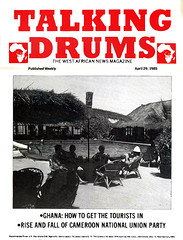Africans Outside Africa...
Black Health Workers Meet On Racism
Kofi Akumanyi
Racial discrimination is a real socio-political problem in modern-day Britain which many people would rather wish was swept under the carpet. The Equal Opportunity Policy, for instance, aims at eliminating discrimination and enhancing equality of opportunity in employment for all. But is it working in reality? KOFI AKUMANYI reports on the Conference of Black Health Workers which examined racism in the National Health ServiceOn November 19, 1983 the Greater London Ethnic Minorities Unit and Training in Health and Race jointly hosted a one-day seminar which brought together health workers ranging from nurses, middle managers, community Health workers and many other race-related associations in London.
The aim was to unite these professionals for the first time and share experiences of black health workers out of which would emerge some evidence of the types of discriminatory practices that hamper the professional development of these people.
Out of the seminar, an association was born to generally "promote and maintain better conditions regarding the welfare of black workers in the NHS particularly through equal opportunities in employment".
A follow-up conference of the association took place in Conway Hall, of the British Ethical Society tucked in the corner of Red Lion Square, Holborn, London. In spite of the uncertain Spring showery rain the rather light attendance did nothing to mar the enthusiasm and the spirits of the participants when the meeting kicked off in earnest around 11.00 am on Saturday, 20 April.
Speaking on "Equal Opportunity and Employment", Dr H. Haynes of the Commission for Racial Equality pointed out that the fight against racial discrimination ought to be tackled on all fronts in the NHS because that institution has a knack for passing the buck. Even though employers are required to back the Equal Opportunity Policy (EOP) it is difficult to monitor what's going on but on issues like nursing education, privatisation of the NHS, Unionism, black employees are certainly disadvantaged and must therefore reach beyond revolutionary rhetorics and state exactly what they want and how they plan to get it.
On the topic of "Racial discrimination in recruitment and training of nurses', Elaine Jackson took the participants through the recruitment procedure pointing out the yawning pitfalls that unwary black applicants may fall in and therefore never get the education they want and warned that to fight racism successfully one must know and follow scrupulously the rule of the game in order to eliminate the usual cliches and excuses that are often thrown at unsuccessful applicants.
She also criticised the general apathy that appears to characterise the whole attitude towards the fight against racism, pointing out that since decision-making which affects rules and regulations in the NHS are taken at the top where no blacks are currently included, the battle appears to be fiercely fought only on the sidelines. She therefore urged Black Health workers to start getting involved in their Local, District and Regional Health Authorities.
Other speakers dealt with "Racism in Clinical Practice" and "Trades Unions and Black Health Workers" in which many instances of discriminatory practices were raised.
The workshops did produce quite interesting details of the issues under discussion which were summed up at the plenary session by the chairperson of the conference, Kofi Agbolegbe. He stressed that racism is a real threat to blacks in the British society today and so long as it continues to relentlessly manifest itself in the National Health Service it ought to be tackled on all levels, including the psychological plane, because the greatest danger to progress is the unwitting internalisa- tion of racism by blacks He warned that it is about time people discarded the "going-home syndrome" and fear of being branded subversives when involved in Black organisations fighting against racism because these two things could lead to total paralysis which would be only in the interest of those who want the status quo to remain.
On the whole, the conference successfully did lay bare the vital areas of racism in the National Health Service and mapped out a plan for combating it with a promise to meet again later on in the year to review the strategy.
See also The case of Dr Mark Ponnampalam
